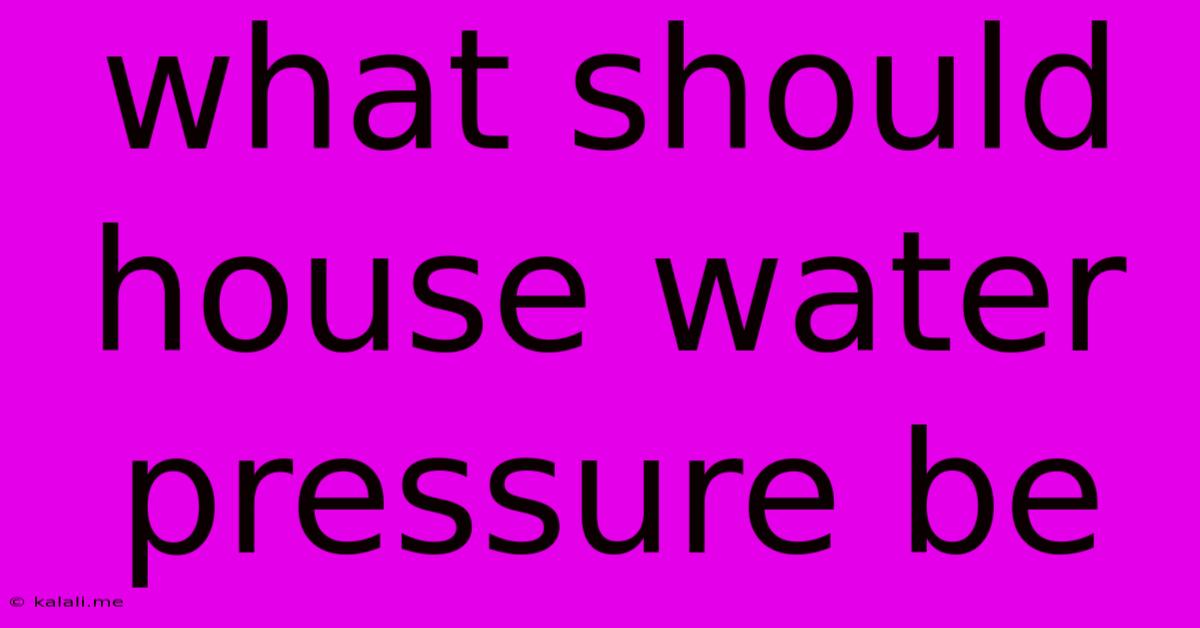What Should House Water Pressure Be
Kalali
Jun 11, 2025 · 3 min read

Table of Contents
What Should House Water Pressure Be? A Comprehensive Guide
Maintaining the right house water pressure is crucial for a comfortable and efficient home. Too little pressure, and you'll struggle with weak showers and sluggish faucets. Too much, and you risk damaging your plumbing system. This guide will help you understand what constitutes ideal water pressure, how to measure it, and what to do if yours is off.
Ideal Water Pressure: The generally accepted ideal water pressure for a home is between 40 and 60 PSI (pounds per square inch). While some sources might suggest a slightly broader range, staying within this sweet spot ensures optimal performance of your plumbing fixtures without causing undue stress on your pipes and appliances. Lower pressure may indicate leaks or restrictions, while higher pressure puts excessive strain on your system.
How to Measure Your Water Pressure
Measuring your water pressure is a simple process that can be done with a relatively inexpensive gauge. You can typically find these at most hardware stores. Here’s how to do it:
- Locate your main water shut-off valve: This is usually found near the water meter, often outside your home.
- Turn off all water-using appliances: Ensure that no faucets, toilets, or showers are running.
- Connect the pressure gauge: Attach the pressure gauge to an outside faucet. This ensures a consistent reading.
- Turn on the faucet: Fully open the faucet.
- Read the gauge: The pressure gauge will display the water pressure in PSI. Note the reading.
- Repeat the process several times: Take multiple readings at different times of the day to ensure accuracy.
Understanding Low Water Pressure
Low water pressure can be caused by several factors:
- Leaks: Leaks in your pipes, faucets, or toilets can significantly reduce overall water pressure. Even small, slow leaks can add up over time.
- Clogged Pipes: Mineral buildup or sediment can restrict water flow in your pipes, leading to reduced pressure.
- Restricted Water Meter: Sometimes, the water meter itself can become restricted, limiting the flow of water to your home.
- Low Water Pressure from the Municipality: In some cases, low water pressure is a result of issues within your local water supply. Contact your water provider to check if they are experiencing any issues.
- Faulty Water Pump (if applicable): If you have a well, a malfunctioning pump is a common culprit for low water pressure.
Understanding High Water Pressure
High water pressure, while seemingly beneficial, can be damaging:
- Pipe Bursts: Excessive pressure can cause pipes to burst, leading to significant water damage and costly repairs.
- Appliance Damage: High pressure can damage water-using appliances like washing machines and dishwashers.
- Leaks: While high pressure doesn't cause leaks directly, it can exacerbate existing small leaks, making them much worse.
What to Do if Your Water Pressure is Incorrect
If your water pressure is consistently too low or too high, it’s essential to address the problem promptly. Here's a breakdown of troubleshooting steps:
- Check for Leaks: Carefully inspect your pipes, faucets, and toilets for any signs of leaks.
- Check for Clogs: If you suspect clogged pipes, you might need to use a pipe cleaner or contact a plumber.
- Check Your Water Meter: Examine your water meter for any signs of restriction.
- Contact a Plumber: If you're unable to identify the cause of the problem, it's best to contact a qualified plumber for professional assistance. They have the tools and expertise to diagnose and repair any underlying issues.
- Pressure Regulator: For consistently high water pressure, a pressure regulator installed on your main water line can help reduce the pressure to a safe and comfortable level.
By understanding the ideal water pressure for your home and knowing how to measure and troubleshoot any issues, you can ensure a consistent and reliable water supply, protecting your plumbing system and maximizing the efficiency of your appliances. Remember, prevention is key – regular checks and prompt attention to any issues will save you time, money, and potential headaches in the long run.
Latest Posts
Latest Posts
-
Moment Of Inertia Of Half Circle
Jun 12, 2025
-
What Are The Factors For 91
Jun 12, 2025
-
Least Common Multiple Of 10 And 20
Jun 12, 2025
-
Civil Service Exam India Age Limit
Jun 12, 2025
-
Letter From To Police To Resident
Jun 12, 2025
Related Post
Thank you for visiting our website which covers about What Should House Water Pressure Be . We hope the information provided has been useful to you. Feel free to contact us if you have any questions or need further assistance. See you next time and don't miss to bookmark.